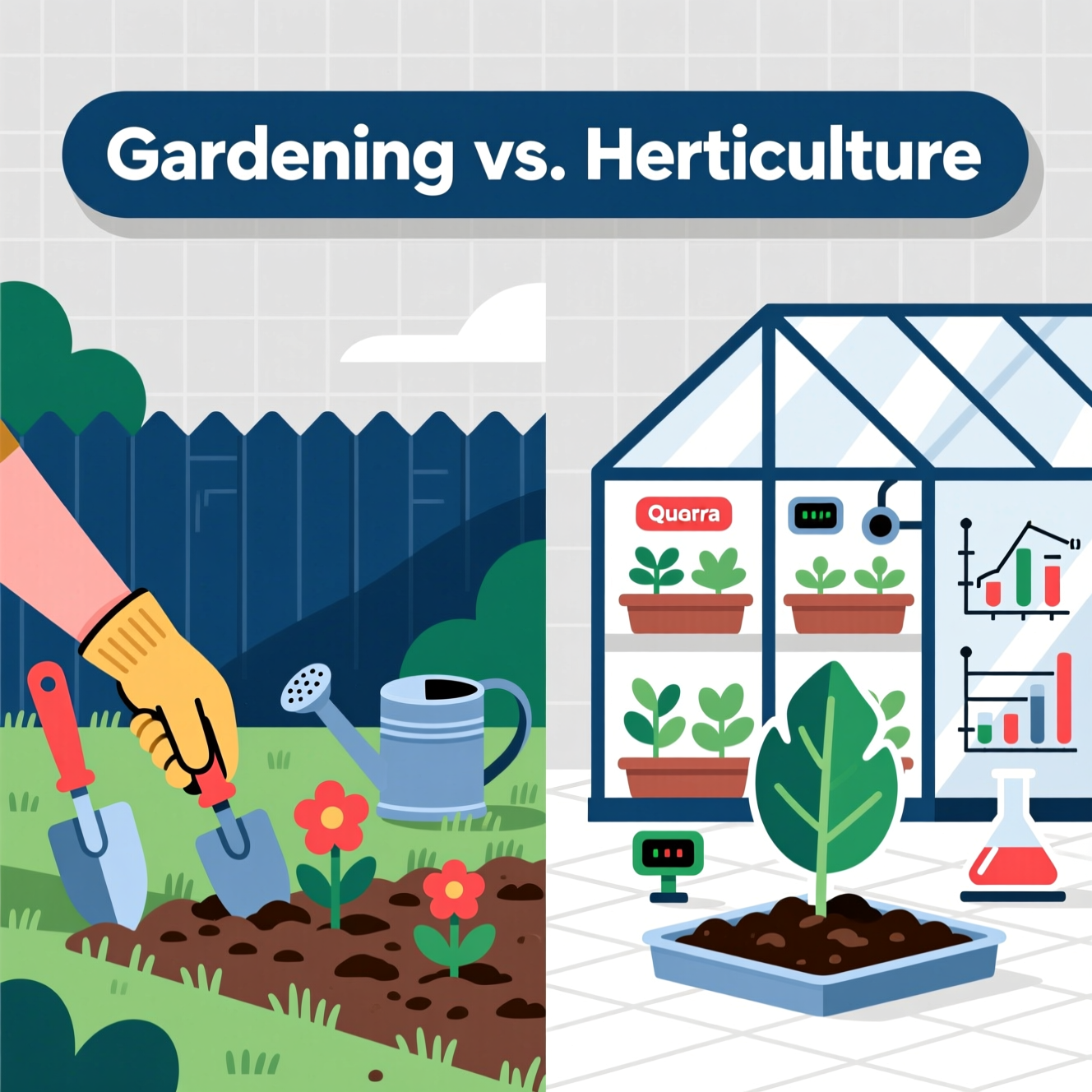What is the Fundamental Difference Between Gardening and Horticulture?
The core distinction between gardening and horticulture lies in their approach and scope. Horticulture, derived from the Latin ‘hortus’ (garden) and ‘cultura’ (cultivation), is the scientific study and practice of growing plants. It encompasses the systematic cultivation of fruits, vegetables, flowers, and ornamental plants. This discipline employs a scientific method to understand plant physiology and optimize growth conditions. Modern experts distinguish it by its research-oriented and commercial applications.
Gardening, in contrast, is the practical act of growing and maintaining plants. This often occurs on a smaller, more personal scale, focusing on aesthetic appeal or personal consumption. While both involve cultivation, horticulture emphasizes a systematic approach and deep biological understanding. Recent studies show the global horticulture market is projected to exceed $1.2 trillion, underscoring its significant economic impact and scientific underpinnings. This vast market relies on horticultural science for efficient production and high yields.
Is Horticulture Simply a More Scientific Form of Gardening?
Horticulture represents a more scientific form of gardening. It applies principles from disciplines like plant physiology and soil science. This advanced approach focuses on systematic cultivation and research. It goes beyond basic plant care to optimize growth and yield. Modern experts consider it a distinct, data-driven field.
Horticulture involves precise techniques such as managing soil pH, typically within a 5.5-7.0 range for many crops. Advanced irrigation methods, like drip systems, can save up to 50% more water. Entomology and plant pathology inform integrated pest management. Effective strategies can reduce crop loss by an average of 15-20%. Horticulture also emphasizes propagation and controlled environments.
How Does Horticulture Relate to Commercial and Market Gardening?
Horticulture principles are fundamental to commercial and market gardening. They guide efficient crop production for profit. This involves optimizing planting densities and precise fertilization schedules. Modern experts emphasize tailored NPK ratios for specific crop needs. Controlled environment agriculture (CEA) also leverages horticultural science for year-round production, ensuring consistent supply chains. This technical application directly impacts crop yield and profit margins.
In practical terms, horticultural knowledge informs critical decisions. This includes selecting varieties best suited for market demand and implementing sustainable cultivation techniques. Hydroponic systems, a key horticultural innovation, can increase crop yields by up to 90% compared to traditional soil methods, demonstrating the power of applied science in a horticultural business. For most gardeners focused on a horticultural business, understanding these technical aspects enhances overall success.
What are the Key Areas of Study Within Horticulture?
Studying horticulture encompasses a wide array of specialized horticultural disciplines. These subjects are crucial for understanding plant cultivation and management. Key areas include pomology, the study of fruit cultivation, and olericulture, which focuses on vegetable production. Floriculture deals with ornamental plants and flowers, while viticulture specifically addresses grape cultivation. Arboriculture is dedicated to the study and care of trees and woody plants.
In practical terms, specialists in pomology often analyze optimal chilling hours for fruit set. Olericulture may involve detailed soil nutrient cycling for crops like tomatoes. Floriculture contributes significantly to the global economy; the cut flower market alone is valued at over $30 billion annually. Landscape horticulture applies these principles to beautify outdoor spaces. Post-harvest physiology is another vital area, ensuring produce quality and longevity after harvesting.
Where Can One Pursue a Career or Education in Horticulture?
Aspiring horticulturists can pursue dedicated horticultural education at numerous universities and colleges globally. These institutions often collaborate with research institutions and extension services to provide robust academic programs. For instance, reputable institutions like the University of California Agriculture and Natural Resources offer comprehensive horticultural training, covering plant breeding and propagation.
Beyond formal degree programs, practical experience is often gained through internships at botanical gardens, nurseries, or agricultural organizations. The demand for skilled horticulturists is rising, with projected job growth in related fields exceeding 10% over the next decade. This growth signifies a strong need for professionals experienced in plant science and sustainable cultivation practices.
In practical terms, individuals seeking to study horticulture will find opportunities in specialized areas such as landscape design, crop production, or urban agriculture. Advanced study can lead to roles in plant pathology, entomology, or genetic research, contributing to innovations in food security and environmental sustainability.
What is the Relationship Between Horticulture and Agriculture?
Agriculture is a vast field encompassing the cultivation of land for food, fiber, and other products. It broadly includes practices like field crops, grain production, and raising livestock. Horticulture, however, is a specialized branch within agriculture. It focuses on the intensive cultivation of high-value crops. These typically include fruits, vegetables, flowers, and ornamental plants, requiring significant expertise in crop science.
Horticultural crops often command higher market prices per acre than staple agricultural commodities. This necessitates specialized techniques and careful management. For instance, optimal soil amendment for many horticultural crops utilizes compost at ratios of 3:1:1 (organic matter: sand: clay) for superior drainage and aeration. This intensity and diversity distinguish it from broad-acre farming.
Are Gardening and Horticulture Equally Important for Sustainable Outdoor Living?
Both gardening and horticulture are vital for sustainable outdoor living. Gardening directly enhances local biodiversity and strengthens food security. Horticulture, meanwhile, pioneers advancements in sustainable agriculture. Innovations include developing drought-resistant crop varieties and optimizing water usage, a critical component of water conservation. These fields collectively support robust local food movements and urban farming initiatives.
Modern best practices emphasize their synergistic impact on sustainability. For instance, some urban gardening programs contribute over 10% of a city’s fresh produce. Furthermore, horticulture drives efficiency in systems like permaculture, which focuses on ecological balance and resourcefulness. These practices ensure vital ecosystem services are maintained and enhanced in our outdoor spaces.

Tyler manages the physical testing of LEDs, pumps, and sensors. With a background in mechanical systems, he is the architect behind our ROI and Yield calculators, transforming complex hardware specs into actionable data for our readers.

